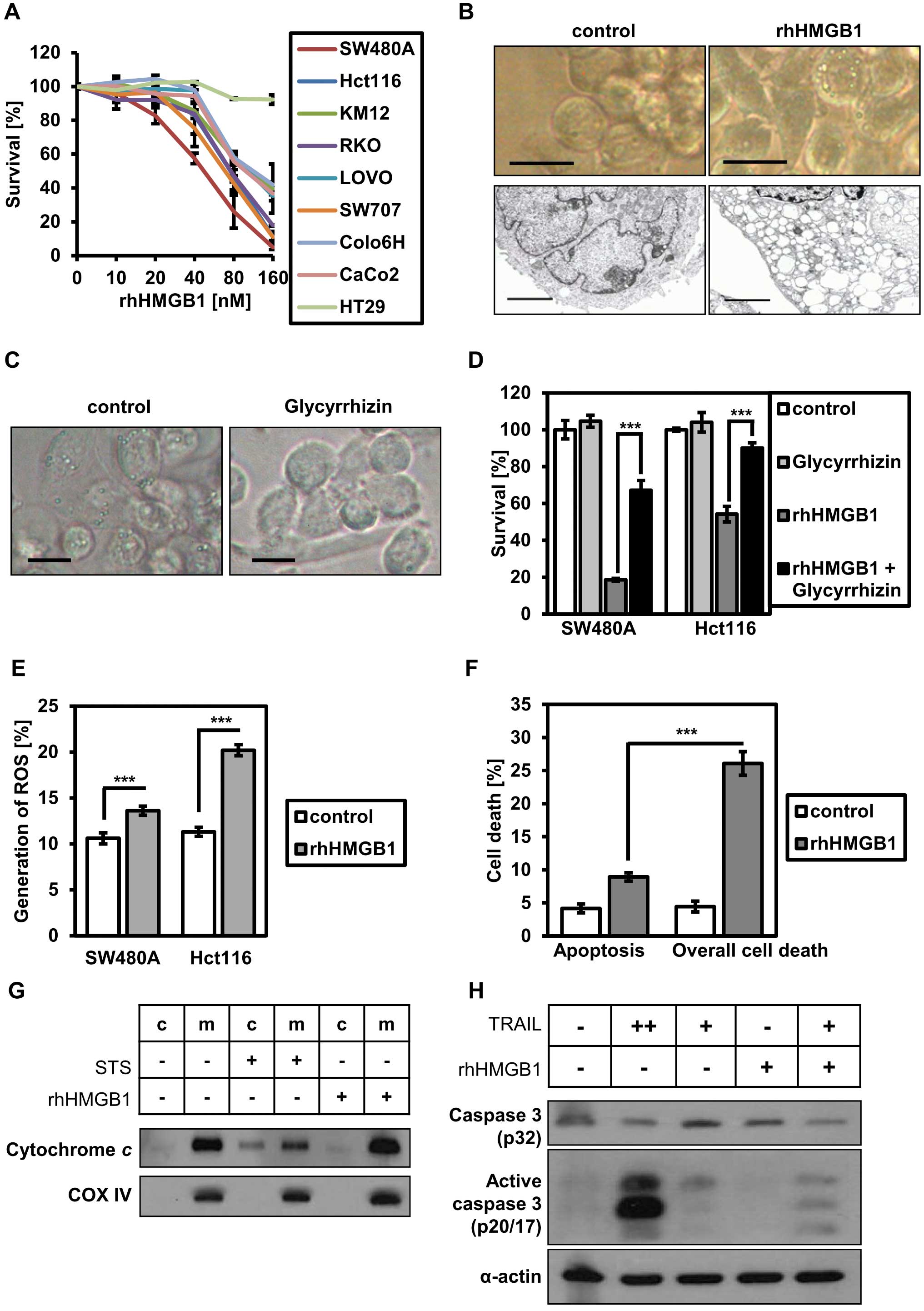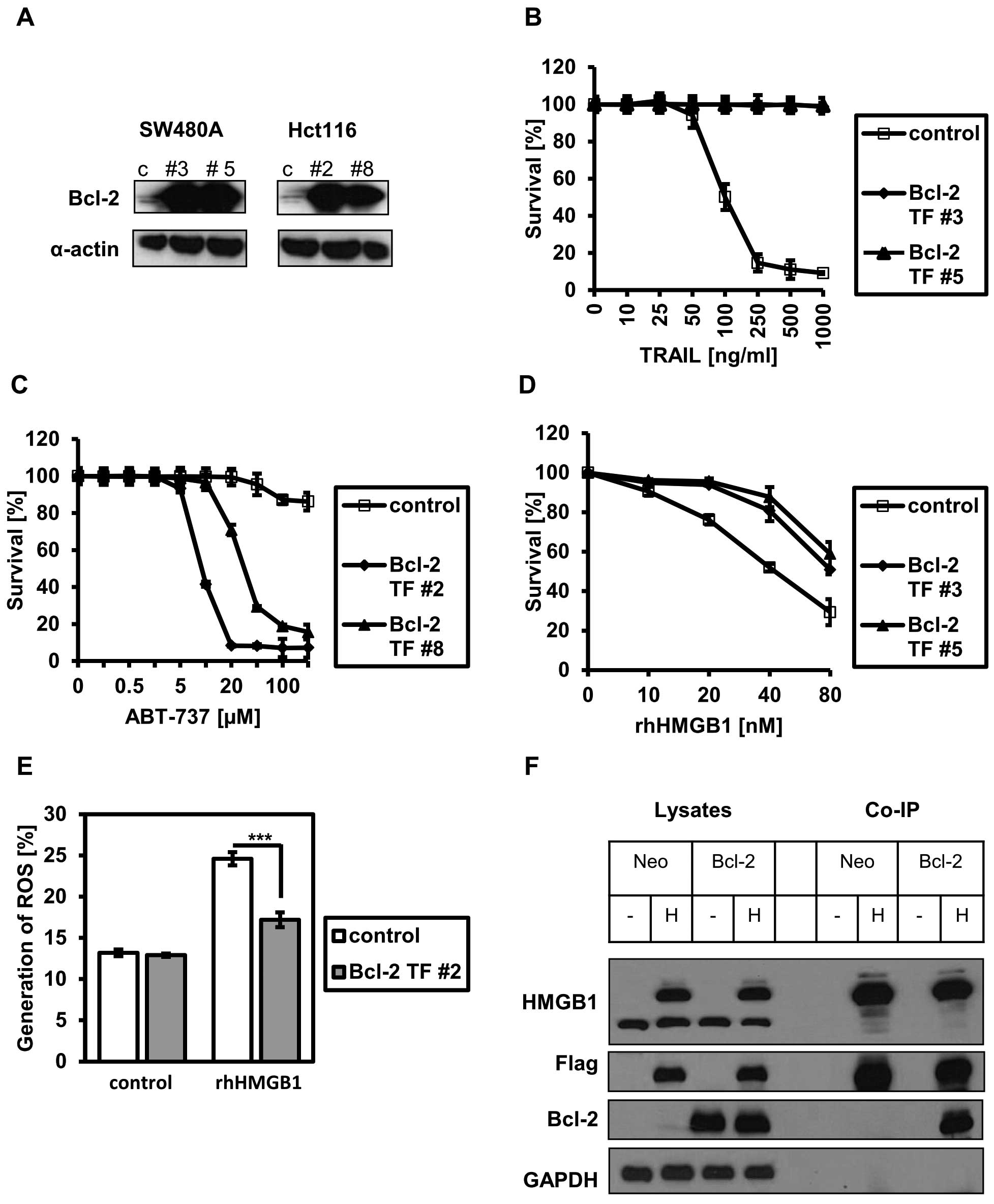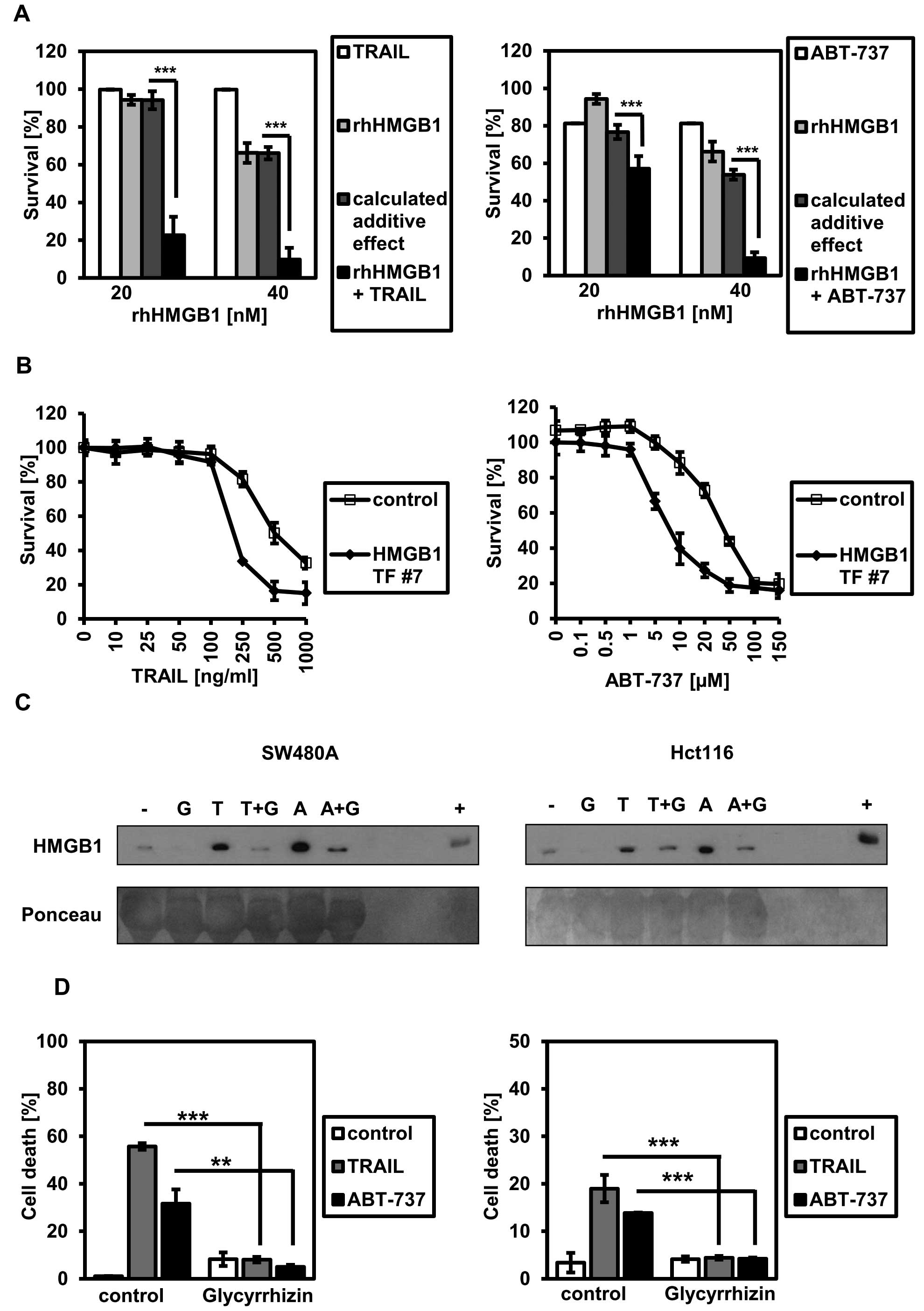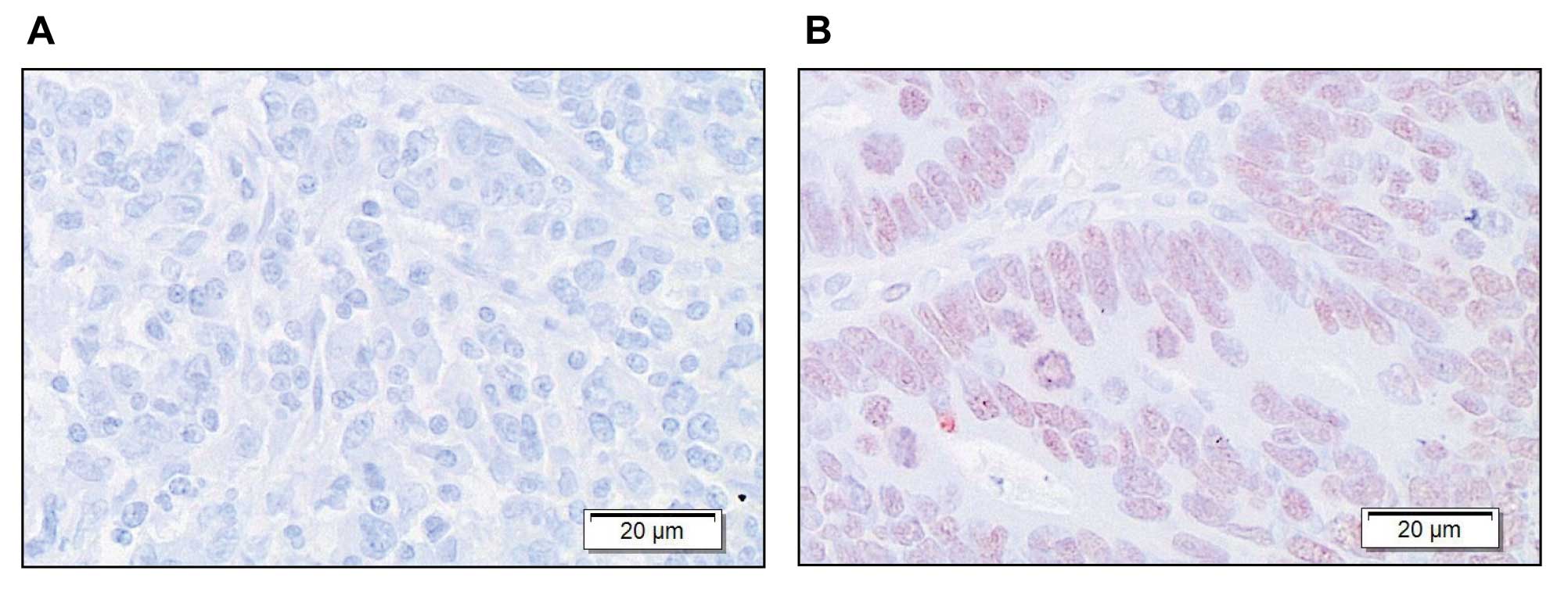|
1
|
Muller S, Scaffidi P, Degryse B, et al:
New EMBO members’ review: the double life of HMGB1 chromatin
protein: architectural factor and extracellular signal. EMBO J.
20:4337–4340. 2001. View Article : Google Scholar
|
|
2
|
Lotze MT and Tracey KJ: High-mobility
group box 1 protein (HMGB1): nuclear weapon in the immune arsenal.
Nat Rev Immunol. 5:331–342. 2005. View
Article : Google Scholar : PubMed/NCBI
|
|
3
|
Shirakawa H, Tsuda K and Yoshida M:
Primary structure of non-histone chromosomal protein HMG2 revealed
by the nucleotide sequence. Biochemistry. 29:4419–4423. 1990.
View Article : Google Scholar : PubMed/NCBI
|
|
4
|
Bustin M: Chromatin unfolding and
activation by HMGN(*) chromosomal proteins. Trends
Biochem Sci. 26:431–437. 2001. View Article : Google Scholar : PubMed/NCBI
|
|
5
|
Wang H, Bloom O, Zhang M, et al: HMG-1 as
a late mediator of endotoxin lethality in mice. Science.
285:248–251. 1999. View Article : Google Scholar : PubMed/NCBI
|
|
6
|
Andersson U, Wang H, Palmblad K, et al:
High mobility group 1 protein (HMG-1) stimulates proinflammatory
cytokine synthesis in human monocytes. J Exp Med. 192:565–570.
2000. View Article : Google Scholar : PubMed/NCBI
|
|
7
|
Zhang XD, Gillespie SK, Borrow JM and
Hersey P: The histone deacetylase inhibitor suberic bishydroxamate
regulates the expression of multiple apoptotic mediators and
induces mitochondria-dependent apoptosis of melanoma cells. Mol
Cancer Ther. 3:425–435. 2004.PubMed/NCBI
|
|
8
|
Scaffidi P, Misteli T and Bianchi ME:
Release of chromatin protein HMGB1 by necrotic cells triggers
inflammation. Nature. 418:191–195. 2002. View Article : Google Scholar : PubMed/NCBI
|
|
9
|
Bell CW, Jiang W, Reich CF III and
Pisetsky DS: The extracellular release of HMGB1 during apoptotic
cell death. Am J Physiol Cell Physiol. 291:C1318–C1325. 2006.
View Article : Google Scholar : PubMed/NCBI
|
|
10
|
Wang H, Yang H, Czura CJ, Sama AE and
Tracey KJ: HMGB1 as a late mediator of lethal systemic
inflammation. Am J Respir Crit Care Med. 164:1768–1773. 2001.
View Article : Google Scholar : PubMed/NCBI
|
|
11
|
Wang H, Ward MF and Sama AE: Novel
HMGB1-inhibiting therapeutic agents for experimental sepsis. Shock.
32:348–357. 2009. View Article : Google Scholar : PubMed/NCBI
|
|
12
|
Yang H, Wang H, Czura CJ and Tracey KJ:
The cytokine activity of HMGB1. J Leukoc Biol. 78:1–8. 2005.
View Article : Google Scholar : PubMed/NCBI
|
|
13
|
Bianchi ME: HMGB1 loves company. J Leukoc
Biol. 86:573–576. 2009. View Article : Google Scholar : PubMed/NCBI
|
|
14
|
Taniguchi N, Kawahara K, Yone K, et al:
High mobility group box chromosomal protein 1 plays a role in the
pathogenesis of rheumatoid arthritis as a novel cytokine. Arthritis
Rheum. 48:971–981. 2003. View Article : Google Scholar : PubMed/NCBI
|
|
15
|
Dumitriu IE, Baruah P, Valentinis B, et
al: Release of high mobility group box 1 by dendritic cells
controls T cell activation via the receptor for advanced glycation
end products. J Immunol. 174:7506–7515. 2005. View Article : Google Scholar : PubMed/NCBI
|
|
16
|
Gdynia G, Keith M, Kopitz J, et al: Danger
signaling protein HMGB1 induces a distinct form of cell death
accompanied by formation of giant mitochondria. Cancer Res.
70:8558–8568. 2010. View Article : Google Scholar : PubMed/NCBI
|
|
17
|
Gillies RJ, Didier N and Denton M:
Determination of cell number in monolayer cultures. Anal Biochem.
159:109–113. 1986. View Article : Google Scholar : PubMed/NCBI
|
|
18
|
Nicoletti I, Migliorati G, Pagliacci MC,
Grignani F and Riccardi C: A rapid and simple method for measuring
thymocyte apoptosis by propidium iodide staining and flow
cytometry. J Immunol Methods. 139:271–279. 1991. View Article : Google Scholar : PubMed/NCBI
|
|
19
|
Ehemann V, Sykora J, Vera-Delgado J, Lange
A and Otto HF: Flow cytometric detection of spontaneous apoptosis
in human breast cancer using the TUNEL-technique. Cancer Lett.
194:125–131. 2003. View Article : Google Scholar : PubMed/NCBI
|
|
20
|
Ehemann V, Kern MA, Breinig M, et al:
Establishment, characterization and drug sensitivity testing in
primary cultures of human thymoma and thymic carcinoma. Int J
Cancer. 122:2719–2725. 2008. View Article : Google Scholar : PubMed/NCBI
|
|
21
|
Webb J: Effect of more than one inhibitor.
Enzyme Metabolic Inhibitors. 1:488–512. 1963.
|
|
22
|
Ulloa L, Ochani M, Yang H, et al: Ethyl
pyruvate prevents lethality in mice with established lethal sepsis
and systemic inflammation. Proc Natl Acad Sci USA. 99:12351–12356.
2002. View Article : Google Scholar : PubMed/NCBI
|
|
23
|
Mollica L, De Marchis F, Spitaleri A, et
al: Glycyrrhizin binds to high-mobility group box 1 protein and
inhibits its cytokine activities. Chem Biol. 14:431–441. 2007.
View Article : Google Scholar : PubMed/NCBI
|
|
24
|
Krishna S, Low IC and Pervaiz S:
Regulation of mitochondrial metabolism: yet another facet in the
biology of the oncoprotein Bcl-2. Biochem J. 435:545–551. 2011.
View Article : Google Scholar : PubMed/NCBI
|
|
25
|
Oltersdorf T, Elmore SW, Shoemaker AR, et
al: An inhibitor of Bcl-2 family proteins induces regression of
solid tumours. Nature. 435:677–681. 2005. View Article : Google Scholar : PubMed/NCBI
|
|
26
|
Tagscherer KE, Fassl A, Campos B, et al:
Apoptosis-based treatment of glioblastomas with ABT-737, a novel
small molecule inhibitor of Bcl-2 family proteins. Oncogene.
27:6646–6656. 2008. View Article : Google Scholar : PubMed/NCBI
|
|
27
|
Kroemer G, Galluzzi L, Vandenabeele P, et
al: Classification of cell death: recommendations of the
Nomenclature Committee on Cell Death 2009. Cell Death Differ.
16:3–11. 2009. View Article : Google Scholar :
|
|
28
|
Kerr JF, Wyllie AH and Currie AR:
Apoptosis: a basic biological phenomenon with wide-ranging
implications in tissue kinetics. Br J Cancer. 26:239–257. 1972.
View Article : Google Scholar : PubMed/NCBI
|
|
29
|
Girard JP: A direct inhibitor of HMGB1
cytokine. Chem Biol. 14:345–347. 2007. View Article : Google Scholar : PubMed/NCBI
|
|
30
|
Chen ZX and Pervaiz S: Bcl-2 induces
pro-oxidant state by engaging mitochondrial respiration in tumor
cells. Cell Death Differ. 14:1617–1627. 2007. View Article : Google Scholar : PubMed/NCBI
|
|
31
|
Hockenbery DM, Oltvai ZN, Yin XM, Milliman
CL and Korsmeyer SJ: Bcl-2 functions in an antioxidant pathway to
prevent apoptosis. Cell. 75:241–251. 1993. View Article : Google Scholar : PubMed/NCBI
|
|
32
|
Huang JC, Zamble DB, Reardon JT, Lippard
SJ and Sancar A: HMG-domain proteins specifically inhibit the
repair of the major DNA adduct of the anticancer drug cisplatin by
human excision nuclease. Proc Natl Acad Sci USA. 91:10394–10398.
1994. View Article : Google Scholar : PubMed/NCBI
|
|
33
|
Wei M, Burenkova O and Lippard SJ:
Cisplatin sensitivity in Hmbg1−/− and
Hmbg1+/+ mouse cells. J Biol Chem. 278:1769–1773. 2003.
View Article : Google Scholar
|
|
34
|
Matsui S, Matsumoto H, Sonoda Y, et al:
Glycyrrhizin and related compounds down-regulate production of
inflammatory chemokines IL-8 and eotaxin 1 in a human lung
fibroblast cell line. Int Immunopharmacol. 4:1633–1644. 2004.
View Article : Google Scholar : PubMed/NCBI
|
|
35
|
Nagai T, Egashira T, Yamanaka Y and Kohno
M: The protective effect of glycyrrhizin against injury of the
liver caused by ischemia-reperfusion. Arch Environ Contam Toxicol.
20:432–436. 1991. View Article : Google Scholar : PubMed/NCBI
|
|
36
|
Kim DE, Youn YC, Kim YK, Hong KM and Lee
CS: Glycyrrhizin prevents 7-ketocholesterol toxicity against
differentiated PC12 cells by suppressing mitochondrial membrane
permeability change. Neurochem Res. 34:1433–1442. 2009. View Article : Google Scholar : PubMed/NCBI
|
|
37
|
Nestl A, Von Stein OD, Zatloukal K, et al:
Gene expression patterns associated with the metastatic phenotype
in rodent and human tumors. Cancer Res. 61:1569–1577.
2001.PubMed/NCBI
|
|
38
|
Fedele M, Bandiera A, Chiappetta G, et al:
Human colorectal carcinomas express high levels of high mobility
group HMGI(Y) proteins. Cancer Res. 56:1896–1901. 1996.PubMed/NCBI
|
|
39
|
Leman ES, Madigan MC, Brunagel G, Takaha
N, Coffey DS and Getzenberg RH: Nuclear matrix localization of high
mobility group protein I(Y) in a transgenic mouse model for
prostate cancer. J Cell Biochem. 88:599–608. 2003. View Article : Google Scholar : PubMed/NCBI
|
|
40
|
Kuniyasu H, Chihara Y, Kondo H, Ohmori H
and Ukai R: Amphoterin induction in prostatic stromal cells by
androgen deprivation is associated with metastatic prostate cancer.
Oncol Rep. 10:1863–1868. 2003.PubMed/NCBI
|
|
41
|
Ram TG, Reeves R and Hosick HL: Elevated
high mobility group-I(Y) gene expression is associated with
progressive transformation of mouse mammary epithelial cells.
Cancer Res. 53:2655–2660. 1993.PubMed/NCBI
|
|
42
|
Bussemakers MJ, van de Ven WJ, Debruyne FM
and Schalken JA: Identification of high mobility group protein I(Y)
as potential progression marker for prostate cancer by differential
hybridization analysis. Cancer Res. 51:606–611. 1991.PubMed/NCBI
|
|
43
|
Dolde CE, Mukherjee M, Cho C and Resar LM:
HMG-I/Y in human breast cancer cell lines. Breast Cancer Res Treat.
71:181–191. 2002. View Article : Google Scholar : PubMed/NCBI
|
|
44
|
Kuniyasu H, Sasaki T, Sasahira T, Ohmori H
and Takahashi T: Depletion of tumor-infiltrating macrophages is
associated with amphoterin expression in colon cancer.
Pathobiology. 71:129–136. 2004. View Article : Google Scholar : PubMed/NCBI
|
|
45
|
Peng RQ, Wu XJ, Ding Y, et al:
Co-expression of nuclear and cytoplasmic HMGB1 is inversely
associated with infiltration of CD45RO+ T cells and
prognosis in patients with stage IIIB colon cancer. BMC Cancer.
10:4962010. View Article : Google Scholar
|
|
46
|
Volp K, Brezniceanu ML, Bosser S, et al:
Increased expression of high mobility group box 1 (HMGB1) is
associated with an elevated level of the antiapoptotic c-IAP2
protein in human colon carcinomas. Gut. 55:234–242. 2006.
View Article : Google Scholar
|
|
47
|
Kusume A, Sasahira T, Luo Y, et al:
Suppression of dendritic cells by HMGB1 is associated with lymph
node metastasis of human colon cancer. Pathobiology. 76:155–162.
2009. View Article : Google Scholar : PubMed/NCBI
|
|
48
|
Apetoh L, Ghiringhelli F, Tesniere A, et
al: The interaction between HMGB1 and TLR4 dictates the outcome of
anticancer chemotherapy and radiotherapy. Immunol Rev. 220:47–59.
2007. View Article : Google Scholar : PubMed/NCBI
|
|
49
|
Apetoh L, Ghiringhelli F, Tesniere A, et
al: Toll-like receptor 4-dependent contribution of the immune
system to anticancer chemotherapy and radiotherapy. Nat Med.
13:1050–1059. 2007. View
Article : Google Scholar : PubMed/NCBI
|
|
50
|
Tesniere A, Schlemmer F, Boige V, et al:
Immunogenic death of colon cancer cells treated with oxaliplatin.
Oncogene. 29:482–491. 2010. View Article : Google Scholar
|
|
51
|
Lim B, Scicchitano A, Beachler C, et al:
FOLFIRI plus dulanermin (rhApo2L/TRAIL) in a patient with
BRAF-mutant metastatic colon cancer. Cancer Biol Ther. 14:711–719.
2013. View Article : Google Scholar : PubMed/NCBI
|
|
52
|
Duiker EW, Mom CH, de Jong S, et al: The
clinical trail of TRAIL. Eur J Cancer. 42:2233–2240. 2006.
View Article : Google Scholar : PubMed/NCBI
|
|
53
|
Balakrishnan K and Gandhi V: Bcl-2
antagonists: a proof of concept for CLL therapy. Invest New Drugs.
31:1384–1394. 2013. View Article : Google Scholar : PubMed/NCBI
|


















